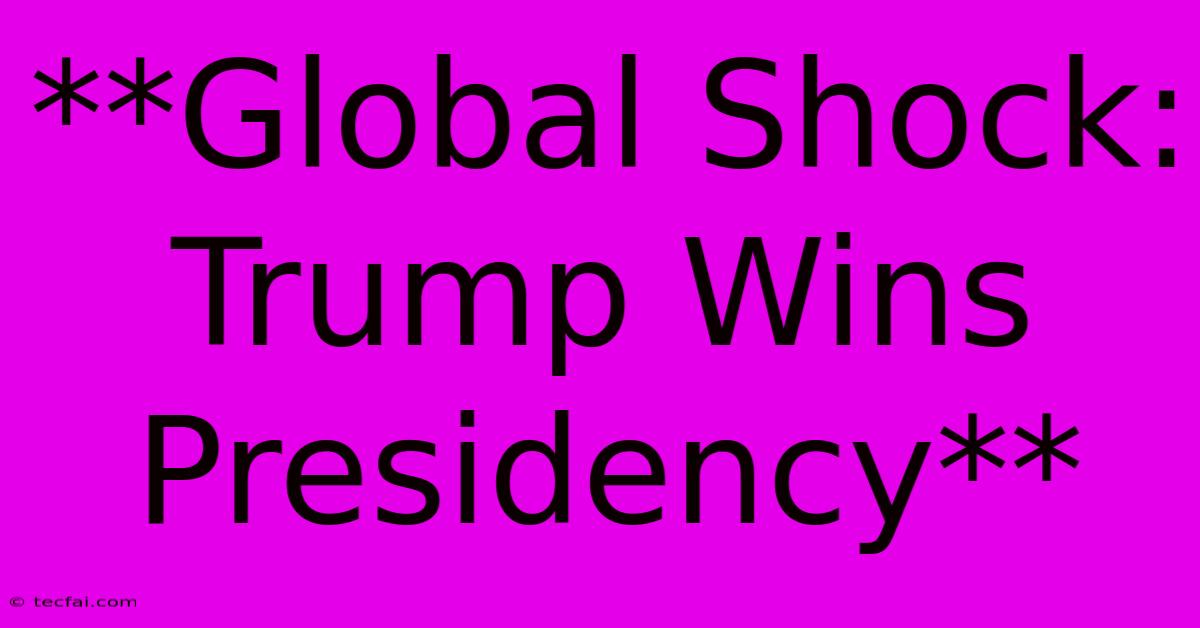**Global Shock: Trump Wins Presidency**

Discover more detailed and exciting information on our website. Click the link below to start your adventure: Visit Best Website tecfai.com. Don't miss out!
Table of Contents
Global Shock: Trump Wins Presidency
The world watched in disbelief as Donald Trump, a political outsider with no prior government experience, was elected the 45th President of the United States in November 2016. His victory, a stunning upset against Democratic nominee Hillary Clinton, sent shockwaves across the globe, igniting anxieties and uncertainties about the future of the United States and its role on the world stage.
A Campaign Built on Discontent
Trump's campaign resonated with a segment of the American population disillusioned with the status quo. He ran on a platform of economic populism, promising to bring back jobs lost to globalization and to "Make America Great Again." His rhetoric, often divisive and inflammatory, targeted immigrants, Muslims, and political elites, appealing to a sense of anger and resentment.
International Reactions: A Mix of Fear and Hope
The global response to Trump's victory was a complex tapestry of fear, hope, and uncertainty. Many international leaders, particularly in Europe and Asia, expressed concerns about the potential consequences of Trump's policies, which often contradicted traditional American foreign policy stances. His rhetoric on trade, immigration, and alliances fueled anxieties about a more isolationist and unpredictable America.
- NATO Concerns: Trump's criticisms of NATO and his repeated questioning of America's commitment to collective defense worried European allies, who saw the alliance as a cornerstone of their security.
- Trade Wars: Trump's protectionist trade policies, including withdrawing from the Trans-Pacific Partnership and renegotiating the North American Free Trade Agreement (NAFTA), raised concerns about potential economic disruptions and trade wars.
- Immigration and Refugee Policies: Trump's harsh stance on immigration, including his proposed ban on Muslim travel and his promise to build a wall along the US-Mexico border, drew condemnation from many countries and humanitarian organizations.
However, some leaders saw Trump's election as a potential opportunity for closer engagement with the United States. Some believed that his emphasis on "America First" could lead to more pragmatic and self-interested foreign policy, potentially beneficial for their own interests.
Trump's Presidency: A Time of Turbulence
Trump's presidency was marked by a series of tumultuous events, both domestic and international. His withdrawal from the Paris Climate Agreement, his imposition of tariffs on Chinese goods, and his decision to recognize Jerusalem as the capital of Israel further strained relations with allies and challenged established international norms.
His erratic behavior and unpredictable decision-making style raised concerns about the stability of the United States and its ability to provide global leadership. His use of social media to communicate directly with the public, bypassing traditional channels of diplomacy, often added to the sense of confusion and uncertainty.
A Legacy of Controversy
Trump's presidency remains a subject of intense debate and scrutiny. His supporters praise him for his economic achievements, his tough stance on immigration, and his willingness to challenge the status quo. His critics condemn his divisive rhetoric, his attacks on democratic institutions, and his foreign policy decisions, arguing they have damaged America's global standing and undermined the international order.
Despite the controversy, there is no denying that Trump's victory marked a significant turning point in American and global politics. It highlighted the growing dissatisfaction with globalization, the rise of populism, and the fragility of the existing international order. His legacy, both domestically and internationally, will continue to be debated and analyzed for years to come.

Thank you for visiting our website wich cover about **Global Shock: Trump Wins Presidency**. We hope the information provided has been useful to you. Feel free to contact us if you have any questions or need further assistance. See you next time and dont miss to bookmark.
Featured Posts
-
Barcelona Dominates Crvena Zvezda 5 2
Nov 07, 2024
-
Great To Have Martin Back Mikels Quotes
Nov 07, 2024
-
Thunder Vs Nuggets Lahat Ng Highlight
Nov 07, 2024
-
Trumps Comments Boost Bitcoin
Nov 07, 2024
-
Power Outage Fails To Derail Uniteds Nbl Victory
Nov 07, 2024
